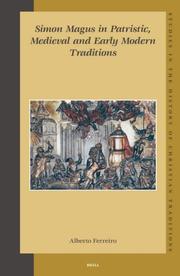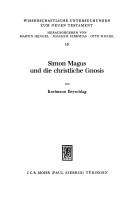| Listing 1 - 4 of 4 |
Sort by
|

ISSN: 15735664 ISBN: 9004144951 9047415469 9789004144958 9789047415466 Year: 2005 Volume: 125 Publisher: Leiden; Boston : BRILL
Abstract | Keywords | Export | Availability | Bookmark
 Loading...
Loading...Choose an application
- Reference Manager
- EndNote
- RefWorks (Direct export to RefWorks)
The volume discusses the post-New Testament Simon Magus from the era of the Church Fathers beginning with Justin Martyr to the early modern era represented in a seventeenth century Baroque relief in the Cathedral of Oviedo, Spain. Sources consulted are artistic, theological texts, historical chronicles, sermons, hagiographies, vernacular literatures, biblical commentaries, and heresiologies. Topics explored are: Traditions and Historiography; Types of Simon Magus in Anti-Gnostic sources; a comparison of the Acts of Peter and the Passions of the Holy Apostles Peter and Paul ; Jerome and Vincent of Lérins on Simon Magus; the Nicolaitian heresy; the Fall of Simon Magus in the Church Fathers; Simon Magus, Dogs, and Simon Peter; Simon Magus in Irish and English medieval legends; Simon Magus, Nicolas of Antioch, and Muhammad; Vincent Ferrer and the canonical and apocryphal Simon Magus; Simon Magus in the Cathedral of León, Spain; Simon Magus in the Cathedral of Oviedo, Spain; and a full bibliographical inventory- 99 entries- of Simon Magus in artistic expression. The book is illustrated with about 28 artistic reproductions. The volume contains author and subject indexes and a full bibliography of works consulted.
Simon, --- Patristique --- Simon Magus --- Simon, - Magus, - 1st cent. --- Cultural influences --- Simon Magus,
Book
ISBN: 9782701022895 2701022894 Year: 2019 Volume: 7 Publisher: Paris : Beauchesne,
Abstract | Keywords | Export | Availability | Bookmark
 Loading...
Loading...Choose an application
- Reference Manager
- EndNote
- RefWorks (Direct export to RefWorks)
L'un des plus grands mythes de notre littérature trouve son origine historique dans un personnage fantasque, mi-charlatan, mi-homme de science et de culture, le docteur Faust de Kundling. Mais les développements littéraires qui ont suivi sa mort singulière se sont appuyés sur différentes figures qui appartiennent au fonds commun de notre culture occidentale. Au premier rang d'entre elles, celle de Simon le Magicien, connue à travers les Actes des apôtres, la tradition hérésiologique (Justin, Irénée), et surtout le Roman pseudo-clémentin. C'est en effet dans cet ouvrage que l'auteur du premier récit sur Faust, le Faustbuch (1587), a puisé nombre des traits qu'il attribue à son anti-héros : le nom même de Faustus (bien attesté par ailleurs comme patronyme du magicien), les pratiques magiques et l'asservissement au démon, mais aussi la présence à ses côtés d'Hélène de Troie, la compagne de Simon. Cette confusion permit à l'auteur une nouvelle assimilation, celle de Faust avec le pape Alexandre VI Borgia, coupable de simonie. L'ouvrage retrace ce parcours littéraire, depuis les Actes des apôtres jusqu'au Faustbuch et quelques-uns des auteurs qui s'en sont inspirés (Marlowe, Goethe, Flaubert, Anatole France).
Simon, --- Faust, --- Faust --- In literature. --- Historia von Doctor Johann Fausten. --- Simon Magus --- Clemens I p. m. --- Pseudoclementina --- Simon, - Magus, - active 1st century. --- Simon, - Magus, - active 1st century - In literature. --- Faust, - -approximately 1540. --- Faust - (Legendary character) --- Simon, - Magus, - active 1st century

ISBN: 3161358724 9783161358722 Year: 1974 Volume: 16 Publisher: Tübingen Mohr Siebeck
Abstract | Keywords | Export | Availability | Bookmark
 Loading...
Loading...Choose an application
- Reference Manager
- EndNote
- RefWorks (Direct export to RefWorks)
Gnosticism --- Simon Magus --- 273.1*1 --- #GROL:SEMI-22:21 --- Gnosis en Bijbel --- 273.1*1 Gnosis en Bijbel --- Gnose. --- Gnosis. --- Gnosticism. --- Gnosticisme. --- Handelingen der Apostelen (bijbelboek). --- Simon le Magicien. --- Simon, --- Simon Magus. --- Cults
Book
ISBN: 0691031738 1306985366 0691603510 1400863112 9780691031736 Year: 1992 Publisher: Princeton (N.J.): Princeton university press
Abstract | Keywords | Export | Availability | Bookmark
 Loading...
Loading...Choose an application
- Reference Manager
- EndNote
- RefWorks (Direct export to RefWorks)
Around the turn of the fifth century, Christian theologians and churchmen contested each other's orthodoxy and good repute by hurling charges of "Origenism" at their opponents. And although orthodoxy was more narrowly defined by that era than during Origen's lifetime in the third century, his speculative, Platonizing theology was not the only issue at stake in the Origenist controversy: "Origen" became a code word for nontheological complaints as well. Elizabeth Clark explores the theological and extra-theological implications of the dispute, uses social network analysis to explain the personal alliances and enmities of its participants, and suggests how it prefigured modern concerns with the status of representation, the social construction of the body, and praxis vis--vis theory. Shaped by the Trinitarian and ascetic debates, and later to influence clashes between Augustine and the Pelagians, the Origenist controversy intersected with patristic campaigns against pagan "idolatry" and Manichean and astrological determinism. Discussing Evagrius Ponticus, Epiphanius, Theophilus, Jerome, Shenute, and Rufinus in turn, Clark concludes by showing how Augustine's theory of original sin reconstructed the Origenist theory of the soul's pre-existence and "fall" into the body.Originally published in 1992.The Princeton Legacy Library uses the latest print-on-demand technology to again make available previously out-of-print books from the distinguished backlist of Princeton University Press. These editions preserve the original texts of these important books while presenting them in durable paperback and hardcover editions. The goal of the Princeton Legacy Library is to vastly increase access to the rich scholarly heritage found in the thousands of books published by Princeton University Press since its founding in 1905.
Church history --- Anthropomorphism --- Theodicy --- Fathers of the church --- Church controversies --- History of doctrines --- Origen --- Influence --- Christian heresies --- Christian sociology --- #GOSA:II.P.AU.1 --- #GOSA:II.P.AU.3 --- #GOSA:II.P.ORI.M --- 219 --- 276 =75 ORIGENES --- History --- Analogieën. Antropomorfisme (theodicee) --- Griekse patrologie--ORIGENES --- Origin. --- Church history - Primitive and early church, ca. 30-600 --- Anthropomorphism - History of doctrines - Early church, ca. 30-600 --- Theodicy - History of doctrines - Early church, ca. 30-600 --- Origen - Influence --- Ambrosiaster. --- Anathema. --- Anchorite. --- Apologetics. --- Apologeticus. --- Apostasy. --- Arian controversy. --- Arianism. --- Arius. --- Asceticism. --- Backsliding. --- Basil of Caesarea. --- Blasphemy. --- Book of Judges. --- Books of Kings. --- Caelestius. --- Celibacy. --- Church Fathers. --- Consubstantiality. --- Council of Ephesus. --- Criticism of Christianity. --- Damnatio memoriae. --- Damnation. --- De fide. --- Dogma. --- Donatism. --- Ecclesiastical jurisdiction. --- Elijah. --- Epistle to the Ephesians. --- Evagrius Ponticus. --- Excommunication. --- Exegesis. --- Exorcism. --- Ezekiel. --- Fall of man. --- False prophet. --- Fear of God. --- Gluttony. --- God. --- Golden calf. --- Good and evil. --- Heresiarch. --- Heresy. --- Heterodoxy. --- Homoiousian. --- Iconoclasm. --- Idolatry. --- Image of God. --- Jacob and Esau. --- John Chrysostom. --- John of Jerusalem. --- Jovinian. --- Justification (theology). --- Macarius. --- Manichaeism. --- Marcion of Sinope. --- Marcionism. --- Matthew 25. --- Maximilla. --- Melania the Elder. --- Metempsychosis. --- Monophysitism. --- Montanism. --- Natural evil. --- Nomina sacra. --- Origen. --- Outer darkness. --- Paganism. --- Panarion. --- Paschal. --- Paul of Samosata. --- Paulinus of Nola. --- Pelagianism. --- Pelagians (Quietism). --- Polemic. --- Predestination. --- Priscillian. --- Priscillianism. --- Psalm 1. --- Religion. --- Renunciation. --- Sabellianism. --- Sexual Desire (book). --- Simon Magus. --- Sin. --- Spiritual body. --- Spirituality. --- Subordinationism. --- Superiority (short story). --- Susanna (Book of Daniel). --- The City of God (book). --- The Righteous Men. --- The Sheep and the Goats. --- Theodicy. --- Theodore of Mopsuestia. --- Theodosius I. --- Theology. --- Treatise on the Resurrection. --- Vigilantius. --- Wickedness. --- Fathers of the church. --- Church controversies. --- Influence.
| Listing 1 - 4 of 4 |
Sort by
|

 Search
Search Feedback
Feedback About UniCat
About UniCat  Help
Help News
News